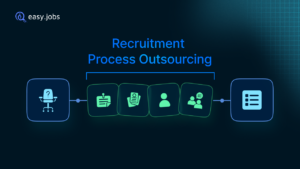A strong relationship with candidates is essential to a successful recruitment strategy. Candidate Relationship Management (CRM) plays a key role in this process, revolutionizing the way businesses connect with potential hires. In this blog, we will delve into the essence of Candidate Relationship Management and explore three top tools that can elevate your recruitment success.

What Is Candidate Relationship Management (CRM)
Candidate Relationship Management is a strategic approach to managing and improving relationships with current and potential candidates. It has evolved from traditional transactional methods to a more holistic, candidate-centric approach. Candidate Relationship Management helps in:
⭐ Engagement: Building meaningful connections with candidates through personalized interactions and consistent communication.
⭐ Communication: Effective and transparent communication at every stage of the candidate journey.
⭐ Data Management: Organizing and analyzing candidate data to derive actionable insights.
⭐ Feedback Loop: Gathering and incorporating candidate feedback to enhance the overall recruitment process.
A Candidate Relationship Management Framework
A well-crafted CRM framework is a dynamic strategy that revolves around engaging, understanding, and building lasting connections with potential candidates. Let’s see the key elements of an effective Candidate Relationship Management framework below.
Database Management
Maintaining a comprehensive and organized candidate database is crucial. This includes their resumes, details about their skills, preferences, and past interactions with the company.
Communication Strategies
Effective communication is at the heart of CRM. Personalizing communication to the needs and preferences of candidates helps in building a positive relationship. Utilizing various channels such as email, social media, and personalized messaging is essential.
Candidate Experience
A positive candidate experience is a key differentiator for employers. Providing a seamless and engaging experience throughout the recruitment process, regardless of the outcome, contributes to building a positive employer brand.
Benefits Of Implementing CRM
The benefits of implementing Candidate Relationship Management extend far beyond the conventional realms of hiring, offering organizations a strategic advantage in talent acquisition. In this discussion, let’s explore the transformative advantages that CRM brings to the table, reshaping the way companies engage with candidates and ultimately influencing their ability to attract and retain top-tier talent.
Talent Pool Building
CRM helps in creating a robust talent pool. By engaging with potential candidates regularly, even if there is not an immediate job opening, organizations can tap into this pool when relevant positions become available.
Enhanced Employer Brand
A positive and personalized candidate experience contributes to an enhanced employer brand. Word-of-mouth referrals and positive reviews from candidates can attract top talent to your organization.
Cost-Efficiency
Building relationships with candidates over time can lead to a reduction in recruitment costs. Engaging with a pool of pre-qualified candidates minimizes the need for extensive and expensive external sourcing.
Effective Candidate Relationship Management Strategy

A well-crafted CRM strategy is the linchpin for organizations seeking to not only attract top-tier talent but also cultivate enduring connections. Let’s see some effective CRM strategies for candidate engagement that increase the recruitment experience of both recruiter and candidates.
Utilizing Technology
Leveraging CRM software and tools can streamline and automate the candidate relationship management process. These tools can help in tracking candidate interactions, sending personalized communications, and analyzing data for continuous improvement.
Personalization And Customization
You can tailor your interactions with candidates based on their preferences and career aspirations. Personalized communication fosters a sense of connection and increases the likelihood of candidates considering your organization in the future.
Feedback Mechanisms
Establish feedback mechanisms to gather insights from candidates about their experience with the recruitment process. This information can be invaluable for making continuous improvements.
Advantages Of Using A CRM Tool
Candidate Relationship Management tools offer numerous advantages for organizations involved in talent acquisition. Let’s have a look.
Positive Candidate Experience
CRMs enhance communication and engagement with candidates, creating a positive candidate experience. These tools enable recruiters to maintain a comprehensive database of potential candidates, allowing for personalized and timely communication. By nurturing relationships with candidates over time, organizations can build a talent pipeline and stay connected with individuals who may be a good fit for future opportunities. This proactive approach improves the likelihood of attracting top talent when positions become available, reducing time-to-fill and enhancing overall recruitment efficiency.
Collaboration And Data Management
CRMs contribute to improved organizational collaboration and data management. These tools facilitate seamless collaboration among recruiters, hiring managers, and other stakeholders involved in the hiring process. Centralized data storage and accessibility ensure that everyone involved has real-time access to candidate information, communication history, and progress.
This collaborative environment streamlines decision-making, enhances team efficiency, and reduces the risk of duplicate efforts. Moreover, CRMs often provide analytics and reporting features, allowing organizations to track key performance indicators (KPIs), assess the success of recruitment strategies, and make data-driven improvements to the hiring process.
Build Employer Brand
Candidate relationship management tools empower organizations to build and maintain a strong employer brand. By consistently delivering positive interactions with candidates, organizations can enhance their reputation as an employer of choice. CRMs enable personalized communication, automate follow-ups, and ensure that candidates receive timely feedback throughout the recruitment process. This contributes to a positive candidate experience and strengthens the organization’s brand in the eyes of both active and passive candidates. A positive employer brand can lead to increased candidate referrals, broader talent reach, and a competitive edge in attracting top talent within the industry.
Top 3 Candidate Relationship Management Tools
Candidate Relationship Management tools have emerged as indispensable assets for modern recruiters. Let’s explore the top three CRM tools that are reshaping the recruitment landscape, offering innovative solutions to streamline candidate interactions, enhance communication, and ultimately elevate the hiring process.
1 easy.jobs

easy.jobs is a SAAS hiring solution that comes with a full managing system of a recruitment process. It is one of the easiest hiring solutions for job recruitment to attract, manage, and hire the right talent faster. This hiring solution is an effective tool for tracking, analyzing, communicating, and evaluating candidates from one platform. It comes with some amazing features that can make your hiring process super easy and time-saving.
This intuitive CRM tool simplifies the recruitment process. It offers a user-friendly interface, making it easy for recruiters to manage and nurture candidate relationships seamlessly. This SAAS recruitment hiring solution also has its plugin version for the WordPress platform with full functionality. Any company having a website can easily build and manage a career page on their site directly from the WordPress dashboard.
The excellent hiring solution easy.jobs contains lots of features. If you want to make your remote hiring process in an expert way, then it will provide you with some fascinating perks to boost your business. And, every feature is fully customizable and responsive for both the recruiter and the candidate. All the features are very easy to use. It allows to analyze and filter the desired applicants to get the right one and helps to make the recruitment process faster than ever before.
5 Key Features:
- Structured candidate pipeline
- Smart AI recruitment strategy
- Advanced tracking & detailed analytics
- Insightful reports from analytics
- Instant smart notifications
2. Zoho Recruit

Zoho Recruit stands out as a robust recruitment solution by seamlessly combining Applicant Tracking System (ATS) and Customer Relationship Management (CRM) functionalities within a unified platform. Designed to meet the diverse needs of staffing agencies and internal HR teams, it offers unparalleled scalability, customization options, and advanced tools for remote hiring.
With Zoho Recruit, organizations can efficiently navigate the entire recruitment process, ensuring a seamless match between the ideal candidate and the right role. The platform offers scalability to adapt to the evolving needs of staffing agencies or internal HR teams, accommodating growth and changes in recruitment demands.
5 Key Features:
- Candidate sourcing
- Hiring Pipeline
- Resume management
- Recruitment analytics
- Video interview
3. Yello

Yello is a specialized Candidate Relationship Management (CRM) platform. It is strategically designed to cater to the demands of high-volume recruiting, streamlining the hiring process for faster position fulfillment. The CRM boasts external job sourcing features, empowering recruiters to efficiently discover talent by automating searches on various job boards and seamlessly importing candidates into the system. Yello’s integrated Applicant Tracking System (ATS) mining ensures targeted searches, allowing companies to pinpoint candidates that best match their requirements. Furthermore, Yello’s integration with LinkedIn enhances recruiters’ ability to swiftly identify and engage with potential candidates on a large scale.
In the realm of high-volume hiring, Yello stands out with its intelligent screening system which automatically filters candidates based on qualifications. This feature expedites the movement of qualified candidates through the hiring pipeline, preventing recruiters from being overwhelmed by a flood of applicants. Notably, Yello’s CRM keeps meticulous track of each candidate in the pipeline, providing detailed reporting that allows companies to assess and optimize their recruiting efforts for greater success. With Yello, organizations can navigate high-volume recruitment with efficiency and precision, ultimately reducing the time it takes to fill vacant positions.
5 Key Features:
- External job sourcing
- Intelligent screening system
- Hiring Pipeline
- Tracking and reporting
- Integration with LinkedIn
10 Tips: How To Choose The Right CRM System For Talent Acquisition
Choosing the right Candidate Relationship Management system is very important for effective talent acquisition and management. Here are some steps to help you select the top CRM system for your needs.
1 Define Your Requirements
You need to identify your specific needs and goals and understand the features and functionality you require in a CRM system. Also, you have to consider your team’s workflow, size, and specific industry requirements while choosing a CRM for your organization.
2 User-Friendly Interface
You can choose a system with an intuitive and user-friendly interface. This ensures that your team can easily adapt to and efficiently use the CRM.
3 Integration Capabilities
You need to ensure that the CRM system can integrate with your existing tools and software such as applicant tracking systems (ATS), HRIS, and email platforms. Integration with job boards, social media platforms, and other recruitment channels is also important.
4 Scalability
You have to consider the scalability of the CRM. You can choose a system that can grow with your organization and accommodate increased data and user needs.
5 Mobile Accessibility
You should check if the CRM system has mobile compatibility. This is crucial for recruiters who need to access information on the go.
6 Data Security And Compliance
You need to ensure that the CRM complies with data protection regulations such as GDPR, HIPAA, or any other relevant standards in your industry. You have to assess the security features to protect sensitive candidate information.
7 Automation And AI Features
You can look for CRM systems that offer automation features, such as automated candidate nurturing, communication, and scheduling. AI-driven capabilities for candidate matching and predictive analytics can enhance the efficiency of your recruitment process.
8 Customization Options
You can choose a CRM system that allows customization to align with your unique recruitment processes and branding.
9 Reporting And Analytics
You should be able to assess the reporting and analytics features of the CRM. This helps in tracking key performance indicators (KPIs) and improving recruitment strategies.
10 Cost And ROI
You should understand the pricing model of the CRM system and ensure that it fits within your budget. You can evaluate the potential return on investment (ROI) based on the features and benefits provided by the CRM.
Think Smartly About Your Next Recruitment
In the competitive landscape of talent acquisition, effective Candidate Relationship Management can make all the difference. By adopting tools, recruiters can streamline their processes and create lasting connections with candidates. As recruitment continues to evolve, investing in CRM tools becomes essential for staying ahead in the race for top talent.
If you think this article is helpful, then subscribe to our blog for more job and workplace-related articles. Also, join us on our Facebook community to interact with more people.






